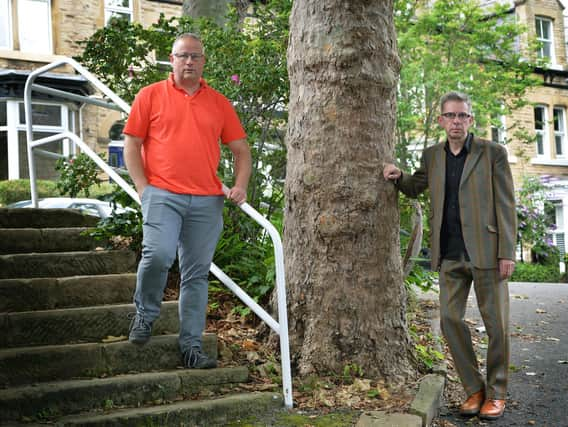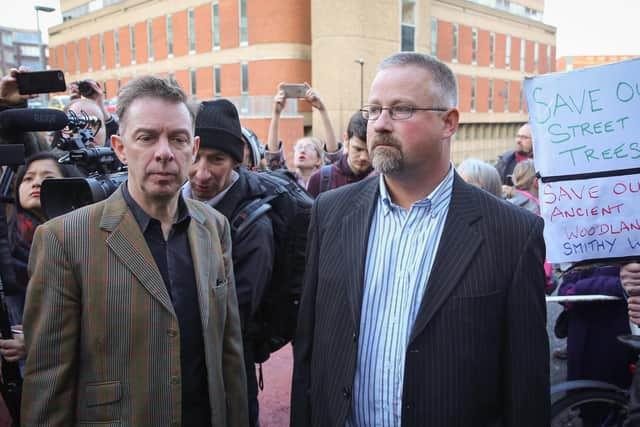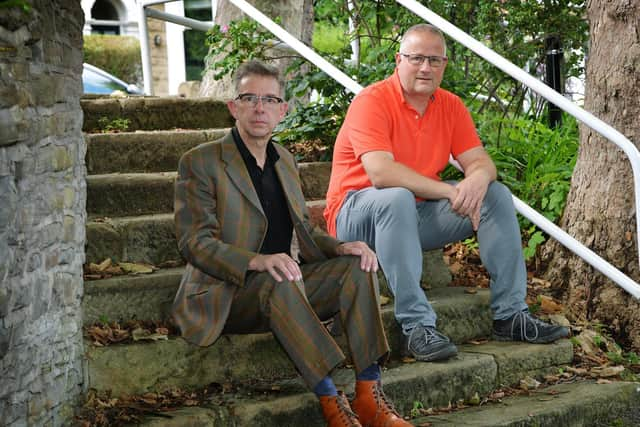How ‘deliberately annoying’ protesters beat the system to stop Sheffield’s mass tree-felling programme


“We were told any number of times that you can’t beat the system, you can’t beat the powers that be,” reflects Calvin Payne on the extraordinary people power campaign that eventually brought a halt to mass tree-felling in Sheffield “We were up against a £2bn contract, a council, a multi-national company, a High Court injunction – everything. But we won hands down in a way we hope will inspire other people. I don’t want anyone to think you can’t change things.”
Payne and fellow campaigner Simon Crump are speaking to The Yorkshire Post over Zoom after recently finding a publisher for their new book Persons Unknown: The Battle for Sheffield’s Street Trees, which tells the story of what happened from the perspectives of dozens of those on the frontline of months and years of protests against the council policy.
Advertisement
Hide AdAdvertisement
Hide AdThe dispute centred around a specific element of the £2bn PFI highways improvement deal called Streets Ahead which Sheffield Council entered into with a company called Amey in 2012 and is due to run until 2037. As well as upgrading roads and pavements, the contract was eventually revealed to specify the removal of 17,500 street trees in the city – around half of the 36,000 total – and their replacement with saplings.


Around 5,500 trees were felled – 2,000 of which were healthy but deemed to be damaging pavements or road surfaces – before work was paused in spring 2018 in the face of increasing protests from campaigners who argued many of the fellings were unnecessary and could have been avoided through simple fixes like kerb repairs.
Campaigners trying to prevent the work, often through the simple measure of standing under a threatened tree for hours on end to prevent it being chopped down, initially faced some demonisation but more recently have enjoyed a string of vindications that seemed almost impossible to imagine a few years ago.
The council has introduced a new approach which has dramatically reduced the numbers of trees being felled, been forced to apologise to the people of the city for misleading the public about its strategy and has even agreed to remove the 17,500 figure from the Streets Ahead contract. An inquiry into what went so wrong - long demanded by campaigners - is to start later this year, while the Government’s draft Environment Bill even includes a “duty to consult” on street tree felling, in what has been dubbed the ‘Sheffield clause’.
Advertisement
Hide AdAdvertisement
Hide AdPayne says that even if the outcome had been different, the campaigners would have stood by their actions.


“If we had been arrested, locked up and all the trees chopped down, we would have still been right. I never had a doubt whatsoever about what we were doing. We started writing the book before the thing was over. It would have been a different story had we lost and in some ways the stories would have been even more important to tell.”
The pair say most active campaigners tended to be either retired, working part-time or self-employed – giving them the opportunity to dedicate themselves to their cause. While campaigners against the tree-felling used frequent questions at council meetings and made multiple Freedom of Information requests to dig into the decision-making process and contract details, the book focuses on the most visible part of their campaign – the direct action protests.
Payne and Crump first met at a protest on Marden Road in November 2016 – the first one Crump had attended after going along as a “substitute” for his then-partner, who was already involved in the campaign.
Advertisement
Hide AdAdvertisement
Hide AdWithin hours the pair were arrested together for standing under a tree under Section 241 of the Trade Union and Labour Relations Act, which is normally used in relation to workers on picket lines during strikes.
Subsequently, the pair along with five other campaigners also arrested under the same law between November 2016 and February 2017 received compensation of over £24,000 from South Yorkshire Police after the Independent Office for Police Conduct ruled the force had “no grounds” to use the legislation in the arrests.
The campaigners started to achieve extraordinary success in preventing work taking place through simply standing under threatened trees. In the month of June 2017 alone, of the 472 fellings attempted, 329 had to be abandoned.
The book, made up of interviews with those who participated in protests and transcribed by Julie Stribley, is called Persons Unknown in reference to the phrasing of a High Court injunction secured by Sheffield Council in August 2017 which prevented both named protesters and any unnamed person entering ‘work zones’ made up of barriers around trees due to be felled.
Advertisement
Hide AdAdvertisement
Hide AdIt led to a new phase in the campaign where people would disguise their identity to enter the zones or become ‘geckos’ who would stand by walls to prevent barriers being put up to create work zones.
The situation reached a head in early 2018 when dozens of police officers and private security guards began accompanying felling crews to operations and multiple arrests started taking place.
Both men happily admit that part of their strategy was to be “deliberately annoying”.
Crump, a university lecturer who would turn up to protests in a tweed suit to deliberately attract attention, laughs: “I found my forte. I have always been annoying and I found a platform to do it on.”
Advertisement
Hide AdAdvertisement
Hide AdPayne adds: “We were preventing them from doing their work for eight hours a day. That would be pretty annoying for anybody. Early on they were quite tolerant of us. But towards the later stages lines started to be crossed when they started giving evidence against us and the campaign in court.
“There was a bit of performance art to it. It was a show with TV cameras and reporters there."
In the book, Crump admits he found being part of a small band of ‘Flying Squad’ protesters who would race around the city trying to prevent fellings in different areas to be exhilarating.
“Above all it was fun,” he writes. “It’s true that we got knocked about and abused, and it’s also true that other parts of our lives suffered from all the time we devoted to stopping the fellings, but it was still the best fun you can have with your clothes on. I was very well-behaved at school and I was never in a gang or anything like that, and so I like to think that my time as a member of this small gang of reprobates made up for my rather dull childhood in some way.”
Advertisement
Hide AdAdvertisement
Hide AdPayne agrees that he also enjoyed the protests to some degree - even when attempts were being made to send him to prison for his involvement.
“During the court cases people would come up to me and say thank you and shake my hands. I was actually enjoying it. I didn’t have anything to lose. I don’t own a house or have any kids. Other people did have those things they risked. I had never been arrested before - I had been in police stations before but never formally arrested. Everyone who was arrested knew what they were doing and were prepared - they knew what was going to happen.”
Unlike Crump, Payne’s involvement with the campaign dated back to 2015. People living around the Rustlings Road area of the city set up the first official campaign group called Save Our Rustlings Trees which eventually led on to the formation of the city-wide Sheffield Trees Action Groups or STAG as it became known.
He recalls: “I went to a council meeting in May 2015 with a couple of people who were all in the Green Party at the time. Two things struck me really clearly - how clued up and knowledgeable the residents were and how the opposite was the case for the council. It was dominated by the issue of Rustlings Road [where tree-felling eventually took place in November 2016 after an infamous ‘pre-dawn raid’ by the council].
Advertisement
Hide AdAdvertisement
Hide Ad“One woman stood up and basically said ‘you can do one, I’m going to stop you’. Not ‘I’m going to campaign against you’, but ‘I’m going to stop you’.
“I had been involved in political activity but I had never been an environmental campaigner. I wasn’t a tree hugger and still don’t think I am but I felt I had to get involved.”
One thing the books makes clear is what Crump calls the “internecine” tension between different elements of the campaign over whether tactics like direct action protests should be adopted.
“Some people thought writing letters or posting on Facebook was going to do it and we thought differently,” he says.
Advertisement
Hide AdAdvertisement
Hide AdPayne says the way they held up the felling work bought time for other aspects of the campaign to prove the case to stop felling work. “If we didn’t do our thing, the rest couldn’t have happened.”
The book also makes clear that the protesters faced plenty of opposition from many Sheffield residents who wanted trees removed.
Payne says: “We tried to treat everywhere the same regardless of whether we were treated as heroes or chased off. We were only ever preventing felling until a proper process took place and that process is happening now.
"Some people spoke to you in a respectful manner - people didn’t know why the trees were going. If somebody was saying my cellar is being damaged or my elderly mother has gone over on her ankle on a branch you could understand where they were coming from.
Advertisement
Hide AdAdvertisement
Hide Ad"The problem was there was no trust at all. The official reasons given for felling were just nonsensical. The council, police and Amey were accusing us of being violent thugs and people believed them. There were thousands of people on Facebook giving us support but there were other people really hoping you got carted off and arrested.”
Finishing the book has been a chance for both men to reflect on a memorable chapter in their lives. Crump says: “Making a stand and disagreeing with people in power and doing it day after day after day can work and protest is effective. It works and we won.”
Payne adds: “I hope people will find the book interesting even if they aren’t interested in the issue. It is not about trees, it is about ordinary people doing extraordinary things.”
Book due for release later this year
Hull-based publisher Wrecking Ball Press is aiming to release Simon and Calvin’s book in late November.
Advertisement
Hide AdAdvertisement
Hide AdEditor Shane Rhodes says: "We’re really pleased to be able to publish the story of those in Sheffield who took direct action to protect the environment and protest, peacefully, against the felling of thousands of street trees.
"Publishing Persons Unknown, a well-written and brilliantly illustrated account of protest, is something that we feel is necessary and important. The story of the protesters who defied their council, linked arms around trees and challenged plans to fell up to 17,500 trees is a fascinating insight into the power of direct action and community spirit.
"Calvin Payne and Simon Crump, along with Julie Stribley, tell this tale of defiance in majestic fashion, with humour, and provide optimism and hope to those who question local authority-backed, environmentally-damaging decision making.”
Support The Yorkshire Post and become a subscriber today. Your subscription will help us to continue to bring quality news to the people of Yorkshire. In return, you'll see fewer ads on site, get free access to our app and receive exclusive members-only offers. Click here to subscribe.
Comment Guidelines
National World encourages reader discussion on our stories. User feedback, insights and back-and-forth exchanges add a rich layer of context to reporting. Please review our Community Guidelines before commenting.